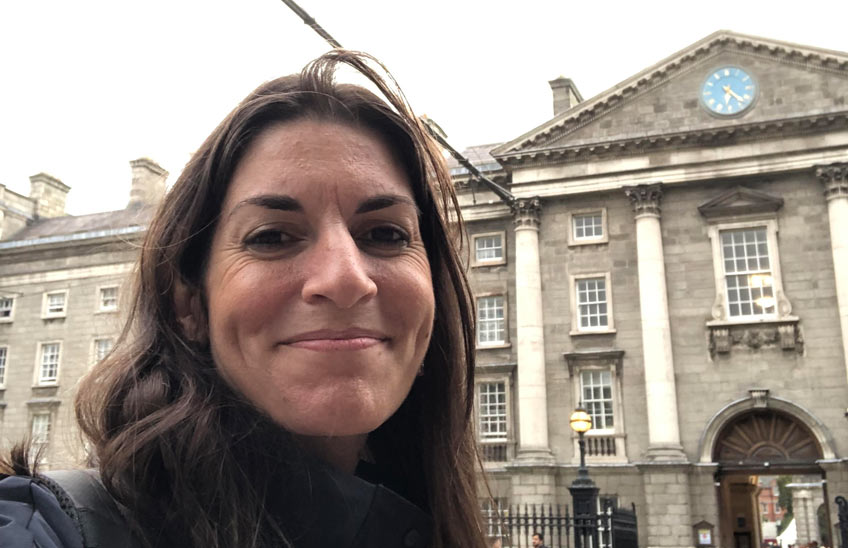training, research and new lines of study: ICS researcher María Calatrava has made a stay at Trinity College Dublin during the 2021-2022 academic year.
María Calatrava has participated in a research on Family Care Centers and on new methods of assessment of processes in psychotherapy.

FotoCedida<br>/María Calatrava, investigadora del ICS, en Trinity College de Dublín.
19 | 10 | 2022
María Calatrava, researcher at the group 'Education oftheaffectivity and human sexuality' of the Institute for Culture and Society (ICS) of the University of Navarra, has made two stays of research at Trinity College Dublin during the academic year 2021-2022. The first one, at the Trinity Research in Childhood Centre (TRiCC) -a group of research on childhood and adolescence- under the guidance of his director, Trevor Spratt. The second, at the School of Psychology of the same University, together with Ladislav Timulak, a reference in Europe in the assessment of the efficacy of model of emotion-focused psychotherapy for the treatment of depression, anxiety and other mental health outcomes.
Regarding the research carried out with Professor Spratt, Calatrava says that his work was focused on identifying the profile of families who go to Family Care Centers and who are at greater risk of social exclusion: "They are places where Dublin families in a state of greater vulnerability can go, requesting social or psychological services to improve their living conditions and care for their children".
Together with her colleagues at research and based on the data collected, they will publish two articles presenting the main conclusions. The expert hopes that the information obtained will contribute to these centers being able to offer a more effective financial aid to those who need it most. "Thus optimizing social resources which, as we know, are always limited," she pointed out.
New international contacts
During the second stay, between January and August 2022 with the expert Ladislav Timulak, he focused on the assessment of psychotherapeutic processes, a line of research of his group in which the project E(f)FECTS of the ICS is framed. Calatrava highlights several very positive points of this stay: "It has given me a broader vision of how the quantitative and qualitative research is connected with the assessment of efficacy in the internship psychotherapeutic ".
His aim was to learn and reverse this training in his group of the ICS and the networking of partnership. "We need to strengthen ties with other universities to be able to take steps in new lines of research with the help of outstanding people in these fields," she says. As a result of these relationships, the expert foresees future collaborations in articles thanks to the synergies achieved.
In addition to the research projects, during her stay, Calatrava attended several congresses, conferences and lectures by supervisors and colleagues.
For the researcher, the balance of this experience is very positive because she has learned about other ways of work, other researchers and other forms of coordination. "What has impressed me most is the great generosity of these people when they involve you in what they do". However, she also wanted to highlight the great challenge at the level of staff, leaving part of her family in Pamplona. For the researcher, it was a responsibility to make the most of her stay and get the most out of it. "You need to continually feel that all the family sacrifice and staff are worth it," she concludes.
